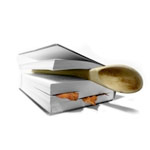 Receta Beef Wellington Pt 1/2
Receta Beef Wellington Pt 1/2
Ingredientes
|
|
Direcciones
- In a roasting pan roast the beef in the middle of a preheated 200 degC oven for 25-30 min, or possibly till a meat thermometer registers 50 degC . Let the fillet cold completely and throw away the larding fat and the strings.
- Skim the fat from the pan juices and reserve the pan juices.
- In a heavy skillet cook the mushrooms in the butter over moderately low heat, stirring, till all the liquid they give off is evaporated and the mix is dry, season them with salt and pepper, and let them dry completely.
- Spread the fillet proportionately with the pate de foie gras, covering the top and sides, and spread the mushrooms proportionately over the pate de foie gras. On a floured surface roll 450 g of the puff paste into a rectangle about 50x30 cm or possibly large sufficient to enclose the fillet completely, invert the coated fillet onto the middle of the dough, and fold up the long sides of the dough to enclose the fillet, brushing the edges of the dough with some of the egg white to seal them. Fold the ends of the dough over the fillet and seal them with the remaining egg white. Transfer the fillet, seam side down, to a jelly roll pan or possibly shallow roasting pan and brush the dough with some of the egg wash. Roll out the additional dough and cut out shapes with decorative cutters. Arrange the cutouts on the dough decoratively, brush them with the remaining egg wash, and refrigeratethe fillet for at least 1 hour and up to 2 hrs.
- Bake the fillet in the middle of a preheated 200 degC oven for 30 min, reduce the heat to 180 degC and bake the fillet for 5-10 min more, or possibly till a meat thermometer registers 55 degC for medium rare meat and the pastry is cooked through. Let the fillet stand for 15 min.
- In a saucepan boil the reserved pan juices and the Madeira till the mix is reduced by one fourth. Add in the arrowroot mix, the broth, the truffles, and salt and pepper to taste and cook the sauce over moderate heat, stirring, being careful not to let it boil, for 5 min, or possibly till it is thickened.
- Loosen the fillet from the pan, transfer it with 2 spatulas to a heated platter, and garnish it with the watercress. Serve the fillet, cut into 2 cm slices, with the sauce. .SH "PUFF PASTE"
- In a bowl combine 250 g of the flour, 50 g of the butter, cut into bits, and the salt and blend the mix till it resembles meal. Stir in 75 ml ice water and, if necessary, continue to add in water, 1 Tbsp. at a time, till the mix forms a soft dough. Gather the dough into a ball, form it into a 13 cm square, and dust it lightly with flour. Refrigeratethe dough, wrapped in wax paper, for 30 min, or possibly till it is hard but not hard.
- In a bowl combine the remaining 250 g butter, cut into bits, with the remaining 30 g flour and toss the mix to coat the butter with the flour. Knead the butter and the flour together and form the mix into a rough square. Put the square between sheets of wax paper and with a rolling pin press it into a 13 cm square. Remove the paper, dust the square well with flour, and wrap it in another sheet of wax paper. Refrigeratethe butter mix till it is hard but not hard. (The dough and the butter should be of equal firmness).
- Roll the dough into an 20 cm square on a floured surface. Lay the butter diagonally in the center of the square and roll the four visible corners of the dough into 15 cm strips. (The dough will form an X around the butter).
- Fold each strip of dough over the butter to enclose the butter completely and turn the dough over, sprinkling the work surface and the dough with flour. With the rolling pin flatten the dough with uniform impressions and roll it into a 30x15 cm rectangle. Turn the dough over, brush off any excess flour, and fold the top third of the rectangle over the center and the bottom third over the top, forming a rectangle about 15x10 cm
- Turn the folded dough seam side down so which an open end faces you. With the rolling pin flatten the dough with uniform impressions. Roll the dough from the center away from you to within 1 cm of the end. Flatten the ends gently with uniform impressions but don't roll the pin over the ends ot the air and butter will be expelled. Reverse the strip on the surface, flouring the surface as necessary, and again roll the dough from the center away from
- continued in part 2
